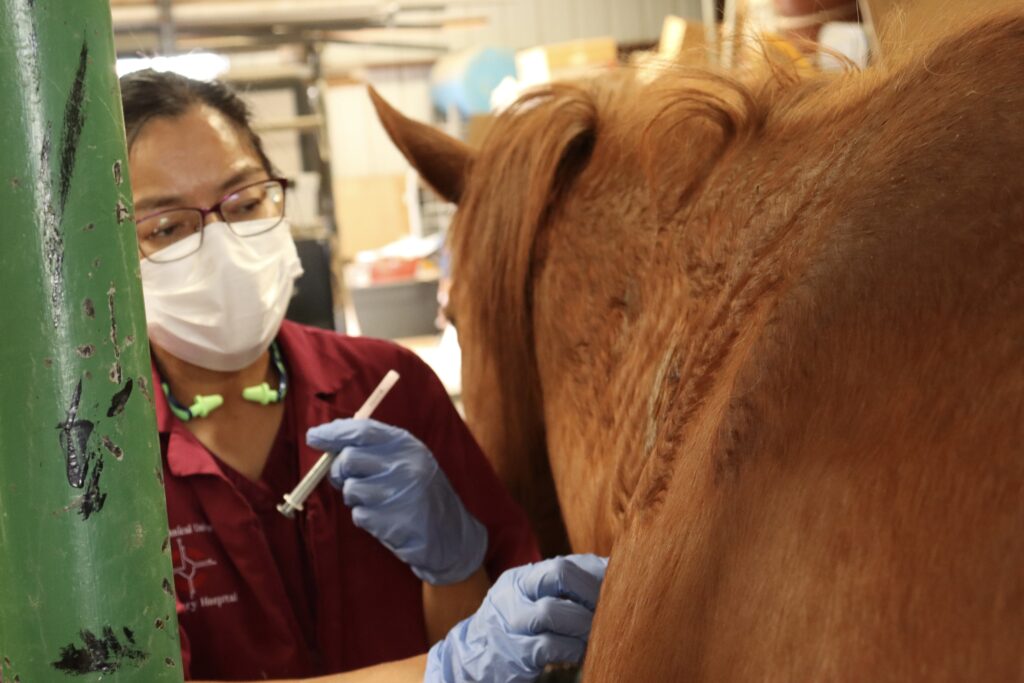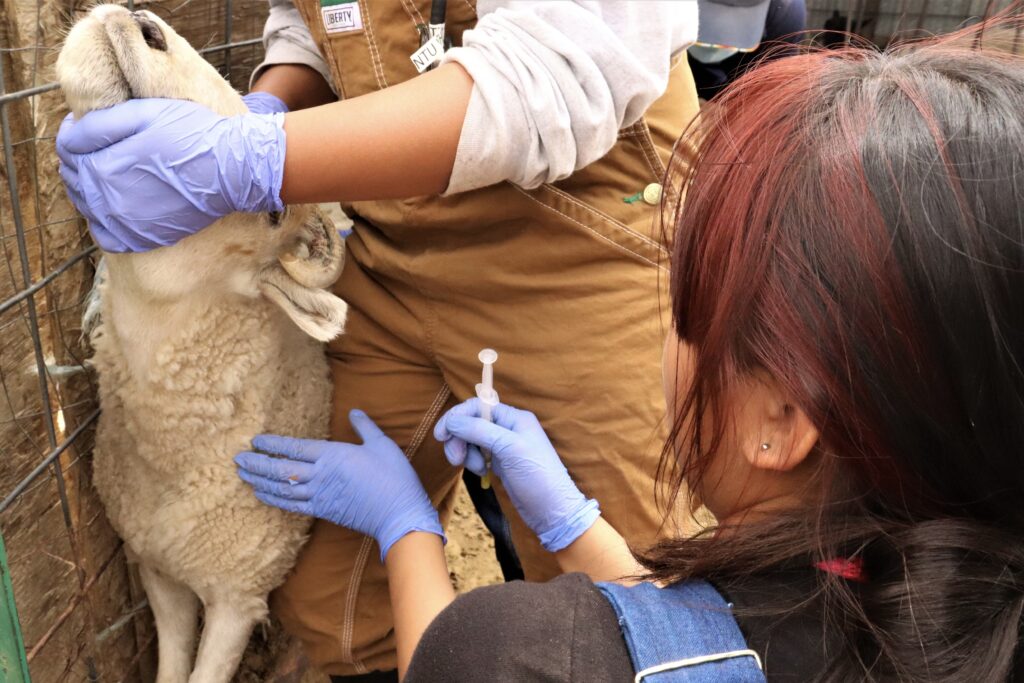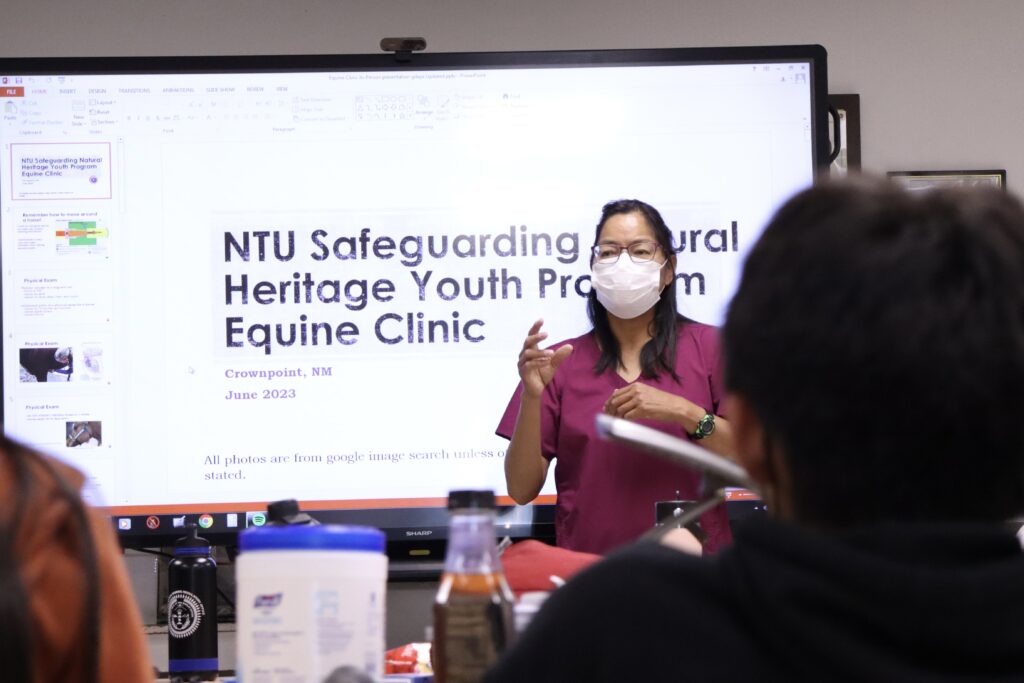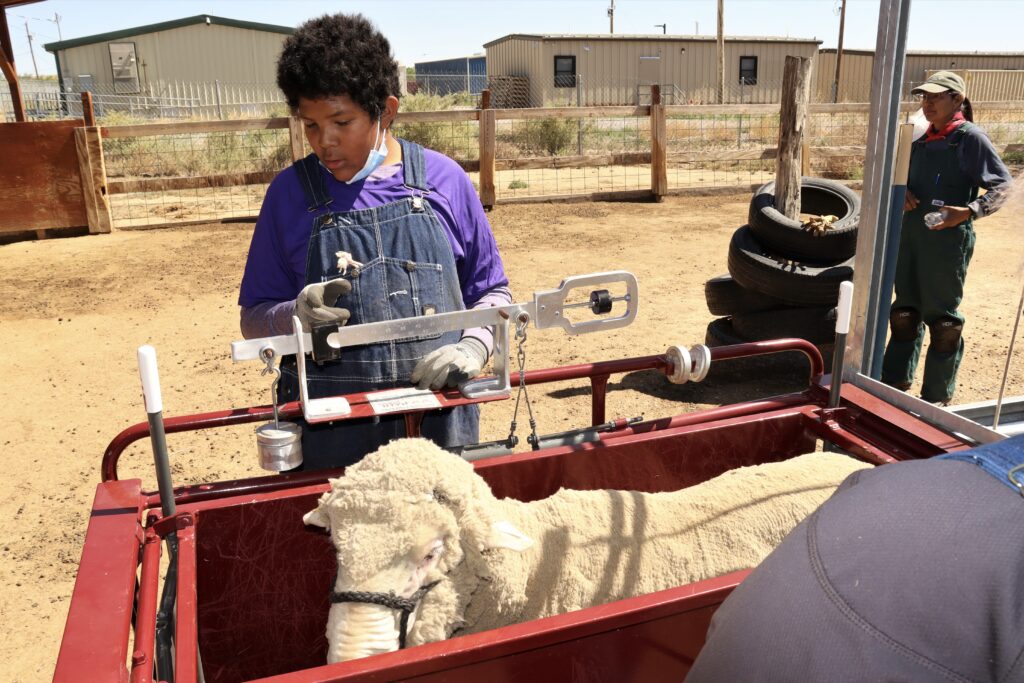Navajo Technical University’s Veterinary Teaching Hospital cares for animals, large and small, while respecting Dine traditions.
By Wafa Hozien

In the heart of the Navajo Nation, nestled amid the striking landscapes of Crownpoint, New Mexico, lies a beacon of hope for both animals and the local community—the Veterinary Teaching Hospital at Navajo Technical University. At the helm of this vital institution stands Dr. Germaine Daye, a dedicated veterinarian and educator who understands that caring for animals is deeply intertwined with the identity of the Navajo Nation.
Dr. Germaine Daye, who has been a part of Navajo Technical University for 14 years, oversees a multifaceted institution that plays a pivotal role in the Navajo Nation’s veterinary care landscape. Established in 2009, the Veterinary Teaching Hospital received accreditation in 2017, marking a significant milestone in providing comprehensive veterinary services to the region.
“Our Veterinary Teaching Hospital isn’t just a clinic,” Daye said, “it’s a bridge between our academic programs and the health of our community’s beloved animals.” The hospital’s services encompass both large and small animals, ranging from cats and dogs to birds, iguanas, prairie dogs, ducks, chickens, rabbits, and ferrets. Their offerings span vaccinations, spaying and neutering, internal medicine services, X-rays, ultrasound, mass removals, surgeries, dental care, disease management, surgical treatments and more.
All this provided using state of the art technology. “We have three sets of lab equipment for diagnostic work on our animals,” Daye said. “A new unit that can give diagnostics in 30 seconds. Our lab equipment is the latest in the field of veterinary medicine, and we make sure to keep it up to date to support our students.”
Daye’s responsibilities extend beyond the clinic to reach the heart of the Navajo community. The hospital, operating both as a business and a hub for learning, serves as an essential bridge between academic programs and practical care.
“The Veterinary Teaching Hospital is the only one in the region,” explained Krystal Louis, a graduate from the NTU Veterinary Teaching Hospital and who now works at the hospital. “It plays a critical role in our community by providing accessible and quality veterinary care.”
One of the most impactful outreach projects is the annual care of over 1,700 sheep and goats belonging to Navajo elders. This endeavor, funded through grants, focuses on providing free preventive care, such as deworming, vaccinations, and health checks. The goal is not only to maintain the health of these animals, which hold immense cultural significance, but also to strengthen the bonds within the community. This project has an immediate, tangible impact on the well-being of the elderly Navajo population and ensures the preservation of cultural traditions. “Our goal is not just to provide veterinary care but also to empower students to become knowledgeable and compassionate professionals who can serve our unique community,” Daye said.

Preserving Navajo Language and Culture
Daye’s approach goes beyond just providing veterinary care. She is keenly aware of the importance of preserving the Navajo language and culture in her work. Speaking Navajo during community programs, especially with older tribal members who may be fluent only in Navajo, creates a connection and an atmosphere of trust. This practice helps bridge communication gaps and ensures that cultural nuances are respected. “Understanding and respecting these beliefs is crucial in our work, for it provides legitimacy for the work that we do,” Daye clarified.
Furthermore, Daye has embraced the Navajo belief system concerning the significance of various animals in their culture. She recognizes the importance of understanding and respecting these cultural beliefs when providing veterinary care. Animals like the coyote, bear, snake, and owl hold specific meanings in Navajo culture, and Daye ensures that her team considers these beliefs when handling and treating animals.
This sensitivity to cultural values not only promotes respect for tradition but also enhances the effectiveness of the care provided. As Krystal Louis explained, “I was inspired to pursue a career in veterinary medicine because I saw the impact it could have on the well-being of both animals and people in the Navajo Nation.”
In Navajo culture, certain animals, like the coyote, bear, snake, and owl, hold special significance and are often considered messengers. Daye’s understanding of these cultural beliefs allows her to approach her work with respect and reverence. It actually helps in navigating delicate situations, such as performing necropsies, by seeking permission and conducting procedures with care.
This awareness and respect for cultural and language is shared by all those who work at the hospital, said Sharie Begay, who has been the hospital’s office manager for 13 years. “We are Navajo-speaking, for example, we explain fasting and other procedures all in Navajo to the owners. We provide services to elderly clients, and our staff and students can communicate in Navajo with them. This is unique to our program.”

Dr. Daye’s influence extends to the academic sphere as she directs food and agriculture courses and runs the only accredited veterinary technology program at a tribal university in the United States. Her goal is clear: to equip students with the knowledge and skills needed to serve their community’s unique veterinary needs.
The veterinary technology program not only produces licensed vet techs but also fosters an environment where students can explore their passions. Graduates like Krystal Louis are encouraged to continue learning and growing, ultimately contributing to the betterment of the Navajo Nation.
“Working alongside Dr. Germaine Daye has been a privilege,” said Louis. “Her mentorship has not only strengthened my professional skills but also deepened my commitment to serving our community.” Sharie Begay added, “as an accredited program, we are held to much higher standards. That’s why our program is so rigorous. Accreditation sets the boundaries and requirements to be done. And as a result our students leave the program prepared.”
Challenges and Aspirations
However, challenges persist. “As the only veterinarian in the area, I understand the immense need for more professionals in this field,” Daye said. Her aspirations include the development of a College of Agricultural Science at Navajo Technical University, which would offer programs in horticulture, fish and wildlife management, and equine science. This expansion would not only enhance educational opportunities but also address the shortage of veterinary care in the region.
“In the future, I hope to see the offering of diverse programs to address the shortage of veterinary care in our region,” she said, a goal affirmed by Sharie Begay. “The Veterinary Teaching Hospital at Navajo Technical University is not just a facility; it’s a gateway to a healthier future for our community and its animals,” Begay said. “Our impact today sets the stage for a brighter, healthier tomorrow.”

In her vision for the future, Dr. Daye hopes that the Veterinary Teaching Hospital continues to thrive, providing top-notch care and fostering cultural understanding. With more faculty, resources, and support, she envisions a stronger, healthier, and more connected Navajo Nation.
Dr. Germaine Daye’s journey is one of dedication, service, and cultural preservation. Her work at the Veterinary Teaching Hospital embodies the essence of community care, where the health of animals and the preservation of cultural traditions are intertwined. As she continues to educate the next generation of veterinary professionals and seeks to expand her programs, Daye remains a beacon of hope for the Navajo Nation’s veterinary care landscape, embodying the spirit of both tradition and progress.
“Our Veterinary Teaching Hospital is not just about healing animals; it’s about healing our community and preserving our traditions, she said. “It’s about nurturing a new generation of compassionate, skilled professionals who will continue to elevate the standard of care for animals in our region and beyond.”
Wafa Hozien, Ph.D. is a university academic affairs executive. Dr. Hozien can be reached @wafahozien on Twitter and Instagram.
Story published October 2, 2023
• • •
Enjoyed this story? Enter your email to receive notifications.
